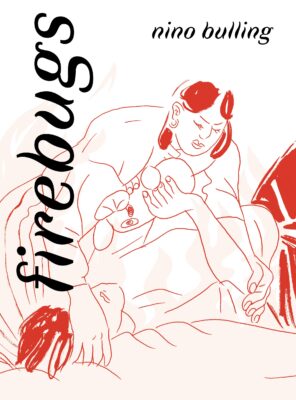Ingken Winter is tired of fire metaphors. “Things burn, and when they’re burnt down, you’re left with piles of ashes and debris and burnt out cars,” they say. “And fire devours everything, you can’t pick and choose. But what if I want to keep certain things?”

Firebugs
Nino Bulling
Drawn & Quarterly
$32.95
cloth
164pp
9781770467057
With a narrative about transitioning set against a backdrop of bushfires and drought-hardened earth, Firebugs is a story about personal and geologic change – and the language we use to apprehend both. For some, metaphor offers respite: a friend imagines people risen “from the ashes as brand-new creatures,” while Lily encourages Ingken to “burn [themselves] to the ground” in order to be reborn. For Ingken, however, the metaphor falls flat. It doesn’t help that the advice comes from Lily’s lover Anya, who uses the phoenix as “an allegory for the climate crisis” in her performance art.
Thematically, the phoenix appears at first as the creature lending the book its mythos. Yet more prominent are the bugs that pepper, and at times animate, the narrative, delineated by Bulling’s red pen in the same manner as the dialogue and sound effects. Lily crushes aphids while Ingken, seemingly out of nowhere, tells their friend about the cloning capabilities of female lice. In summer, insects flit around as Ingken tries mouthing a new name, later swooping dangerously close to candles while they and Lily watch the lights of the oil refinery dance on the horizon. When Ingken asks Lily about her own transition, the conversation is overlaid with images of firebugs mating. Down to the motion of Bulling’s illustrations, loose and biomorphic, insects guide the novel as an understated alternative to the glory of the phoenix.
Turning away from myth, Firebugs instead shines in moments of subtle attention to the natural world, especially its shapes and forms. Careful symbolism is woven throughout, with the lightness of Bulling’s pen managing not to seem overdrawn where the imagery could otherwise become heavy-handed. Lily, for instance, is coded in an intentional way by virtue of her botanic first name and penchant for floral fabrics, while Ingken (surname: Winter) remains by contrast frozen in place, bogged down under layers of clothing even in the heat of the summer. As temperatures rise, tempers shorten, and the ash-browned icebergs that Ingken doomscrolls past are a reminder that nothing can move at a glacial pace while everything is melting. No phoenix rising from the proverbial ashes, Ingken appears instead a bird too scared to quit the shore, no matter how inhospitable it becomes.
Firebugs is a story about standing on the precipice of transformation, even as the ground erodes beneath. What spreads its wings may not be a phoenix, fully formed in the flames – there’s “no magical resurrection,” as Ingken says. Instead, Firebugs presents a more bittersweet image of change as necessary and ongoing, conditional even, for survival.mRb






0 Comments